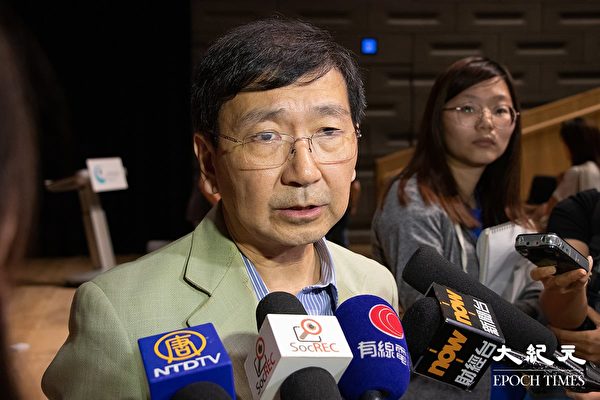The High Court judge designated under the Hong Kong National Security Law ruled last week that indiscriminate rejection of the financial budget by Legislative Council members severely obstructs the executive branch, constituting “subversion of state power.” University of Hong Kong Law School adjunct professor Chan Man Min stated on a radio program that this is arranged in the Basic Law, and under the court judgment, it implies “either the Basic Law violated the National Security Law.”
According to Article 50 of the Basic Law, if the Legislative Council refuses to pass the government-proposed financial budget after consultations fail to reach a consensus, the Chief Executive can dissolve the Legislative Council. Article 51 specifies that the Chief Executive can apply for temporary funding from the Legislative Council. If the Legislative Council has been dissolved and cannot approve funding, the Chief Executive can approve temporary short-term funding based on the spending standards of the previous fiscal year before a new Legislative Council is elected. The host asked whether under the court’s ruling, Article 50 cannot be implemented and if it needs modification.
Chan Man Min responded, “either the Basic Law violated the National Security Law.” He believed that when Article 50 was drafted in the 1980s for the Basic Law, the balance of power between the legislative and executive branches was established for checks and balances. However, if the relationship between the two sides reaches this stage, not to mention temporary funding, even it would be difficult for the government to introduce new plans. Article 51 ensures that in such a situation, the government can function while waiting for a new Legislative Council, questioning if this design is not feasible, whether the temporary funding cannot be obtained if removed, making the situation worse. “If you can continue to allocate funds, rejecting the financial budget is pointless.”
When asked if it could be modified to cancel the arrangement for the Chief Executive to step down under this circumstance, Chan Man Min laughed, saying, “It is better to cancel the power to reject the financial budget altogether.”
Chan pointed out that the court’s observation had significant omissions because Articles 50 and 51 of the Basic Law had designed that allow the government to obtain temporary funding from the previous fiscal year, ensuring the government’s operation would not be hindered.
Furthermore, he questioned why demands for replacing the government when the Legislative Council is re-elected, discontented citizens, as it implies demanding government change. He questioned how this constituted “subversion of state power.” He also raised concerns about whether following the arrangement of the Basic Law would be considered “illegal behavior.” The Legislative Council is a place for bargaining, rejecting ordinances in exchange for concessions from the government elsewhere, questioning if this is an abuse of power. If this is illegal, “the parliament will only be a rubber stamp” in the future. He gave examples where legislators could bargain with the government on issues like universal retirement protection or refuse collection fees.
Chan added that many primary election participants were based on the “Five Demands” and indicated they would reject the budget, but whether the “Five Demands” could be realized is a political consideration, not something the court could judge, suggesting that bargaining could still take place during the process.
Chan cited past government views that Hong Kong should not have a separation of powers, saying that if balancing each other is canceled, it could be permissible, but when the power of the executive branch is unrestrained, numerous problems could arise. “Unchecked power is equally dangerous.”
Chan also mentioned that according to the current court logic, the purpose of the primaries was to reject the financial budget without distinction. After holding two press conferences, citizens knew the purpose of the primaries was also an essential part of rejecting the financial budget without distinction. It involved “assistance,” questioning if this violates the National Security Law. Involving hundreds of thousands of participating citizens, they all “agree and understand,” reflecting that according to the court’s logic, the impact is significant, also showing the judgment itself is absurd.
Legally, what impact does this judgment have? After a sigh, Chan stated that no more expectations should be placed on the operation of the parliament. “The government’s stance is that any challenge to the Basic Law, the government’s authority, basically may have violated the National Security Law.” In a series of cases, including the prohibition of “Glory to Hong Kong,” the court emphasized its responsibility to protect national security, saying it is essential, but questions whether it goes too far, overriding everything.
Article 4 of the Hong Kong National Security Law states that maintaining national security should respect and safeguard human rights. Chan pointed out that under this arrangement, the court should balance and protect both, but he questioned whether currently, Article 4 seems merely ornamental, engaging in “overcorrection,” where the court does not seem to be playing the role it should.

